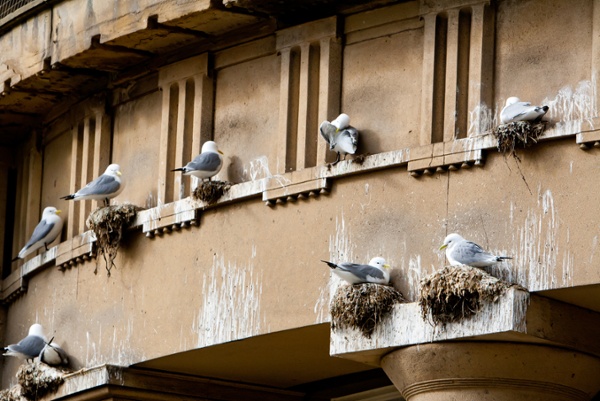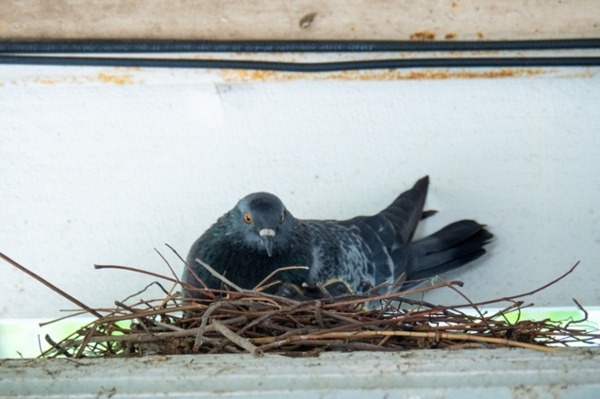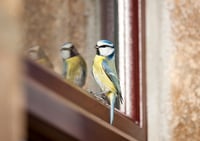
A few birds flying around your commercial building or parking lot may seem harmless and even welcome. Unfortunately, these birds are often seeking a safe place to nest, which could bring many problems to your business. Nest bids damage commercial properties, with bird droppings, roof damage, and even fires costing business owners tens of millions of dollars each year.
While it seems impossible for such small creatures to inflict so much damage, consider the cost of replacing the roof on your commercial building if it collapses due to the weight of bird excrement. A single pigeon can produce 25 pounds of fecal matter each year. When these birds travel, roost, and nest in flocks of 100 birds or more, droppings can accumulate quickly, compromising the structure of your building.
How Nesting Birds Damage Commercial Properties
Often, birds like pigeons become pests in commercial areas due to unintentional feeding or other attractive aspects of your building like sheltered ledges or window sills. When these birds make themselves at home in your building, they can cause expensive damage in various ways. Here are the most common ways nesting birds damage commercial properties.
1. Damage From Droppings
Bird droppings aren't only messy and gross; they also cause severe damage in a variety of ways. Bird droppings contain uric acid with a pH of 3 to 4.5, which can eat through most building materials if left untouched. Even bird droppings in your parking lot or other areas customers and employees frequent can be a costly problem. Bird droppings often add up to slippery, messy piles.
Each year, people and organizations spend $50 billion on medical costs related to non-fatal fall injuries. If bird droppings lead to slip and fall injuries on your property, then you could be liable for related medical costs.
2. Roof Damage
Nesting birds damage commercial properties wherever they gather, and birds spend a lot of time on roofs, but most people aren't aware of the damage these seemingly harmless creatures can cause. Bird droppings are corrosive and can eat away at the surface of most building materials. These droppings are also heavy. Nesting materials often block gutters, leading to standing water on your roof, which adds additional weight and can lead to eventual collapse.
The natural nesting behavior of birds can lead to structural damage as birds seek shelter. Nesting birds peck at roof shingles, seek shelter under solar panels, and build nests in electrical signs. After damaging the roofing materials, these birds may even find their way into your building and nest in attic insulation or storage areas. The resulting roof leaks, food consumption, and bird waste destroy food products and other commercial products stored in areas where birds nest.
3. Fire
Bird nests contain dried droppings, feathers, twigs, leaves, and straw. Birds often use these highly flammable materials to create a sheltered home near the warmth provided by signs and electrical junction boxes. This creates a potential fire hazard, and the costs of fire damage restoration add up quickly.
Fire damage isn't limited to the area where the flames occur. Water, soot, and smoke create costly damage throughout the building. The price of this damage is high for homes, but it's even more expensive in commercial buildings. Fire damage restoration is usually priced by the square foot. This means repairs to a large commercial building means a significantly higher price tag. Since state and local ordinances often require commercial buildings to have sprinklers, they're often more likely to sustain substantial water damage, as well.
4. Water Damage
The nesting habits of birds can lead to serious drainage issues for your commercial building. Your gutter system should divert rain and snow away from your building. When bird nests, feathers, and droppings clog your gutters, you may experience damage to the building's foundation, soffits, and facia boards. In extreme cases, pooling water on your roof can lead to leaks or even roof collapse.
Gutter repair costs can add up quickly. On average, galvanized steel gutter repair for a single-story home can cost $170. A home with three or more stories can cost $500 or more. Gutter repair is typically even more expensive for commercial buildings. Residential gutter systems can be constructed out of aluminum or vinyl, which may cost $5 -$8 per linear foot. Commercial buildings are more likely to require galvanized steel, costing $10-$11 per linear foot. Additional costs might also be added for risk due to the height of your commercial building and the larger gutter size required for commercial buildings.
5. Product Damage
When birds nest inside commercial buildings or warehouses, they can wreak havoc on the products you have in storage. Birds are primarily seeking food and shelter. Storage areas that house food products provide birds with everything they need. Nesting birds damage commercial buildings’ stored products by:
- • Eating food and medicine products
- • Fouling products with waste
- • Infesting products with parasites like ticks, mites, and other insects
The only limit to the cost of how nesting birds damage commercial properties and stored goods is the number of products exposed to pest birds.
6. Blocked Ventilation Systems
Chimneys and ventilation systems provide attractive sheltered spaces for bird nests. Commercial buildings often have a variety of ventilation system ducts that birds can target. Nests blocking these ducts aren't merely annoying. They can become dangerous. In 1995, a family narrowly escaped death when a bird nest blocking a furnace ventilation pipe caused the home to fill with carbon monoxide.
Addressing Bird Nesting Issues Around Commercial Buildings

When it comes to protecting your commercial building from nesting birds, prevention is the best medicine. Eliminating food sources and spaces where birds can comfortably roost and nest will allow you to prevent the costly damage that can occur. Begin by eliminating any outdoor food sources that may attract birds to your building. Also, erect signs to remind guests not to feed pest birds and place lids on all outdoor trash cans.
Outfitting your commercial building with protective solutions is often the best way to deter pest birds seeking a sheltered nesting spot. Experts design these products to safely deter birds without causing harm or disrupting nests after they're built. Some of the most effective bird deterrents for commercial buildings include:
- • Bird spikes that make perches uncomfortable
- • Bird slides that make ledges too steep for birds
- • Netting products to keep birds out of spaces where they aren't welcome
Preventing birds from using your commercial property as a nesting ground can be difficult. But it isn't impossible. Get in touch with the bird control experts at Bird Barrier to learn more about how to protect your commercial building from the damaging effects of nesting birds.
About Bird Barrier
Bird Barrier is a leader in innovative technology designed to prevent birds from landing, roosting or nesting. We specialize in urban bird control to remove birds humanely and effectively. Our website, birdbarrier.com, hosts a wealth of content to help people understand and identify bird control solutions for various problems with pest birds. Please contact us if you need help with a bird related problem. You may also benefit from our free guide, Bird Deterrents: The Complete Guide.






